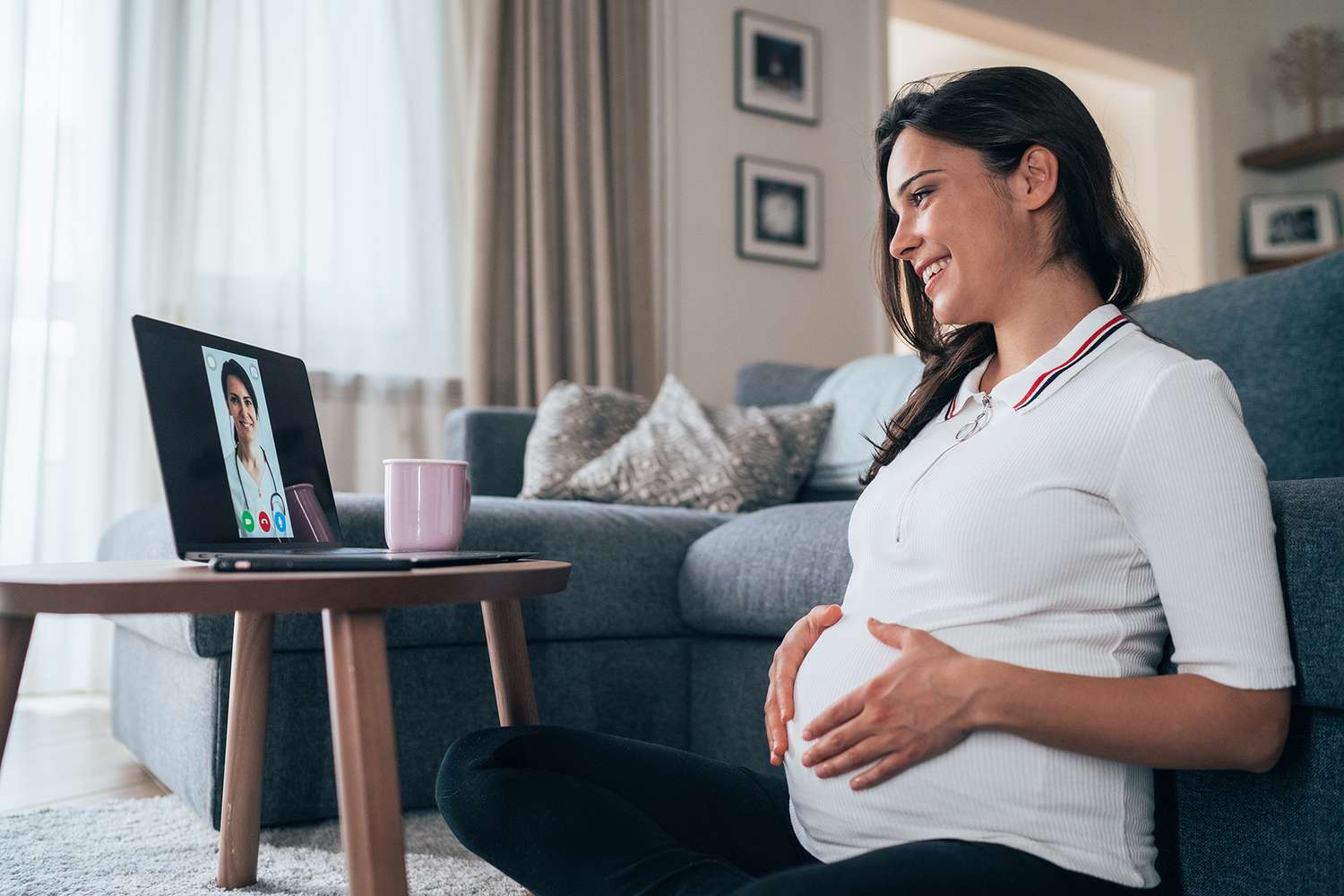From the pros (super-convenient appointments) to the cons (not being able to hear your baby’s heartbeat), real women share what this new form of health care has been like for them.
When the COVID-19 pandemic hit the U.S., many non-essential medical visits, surgeries, and check-ups were postponed (bye, regular teeth cleanings) while others (i.e. prenatal visits) pivoted to what’s quickly become a new industry-standard: virtual health care.
In fact, The American College of Obstetricians and Gynecologists (ACOG) even released new guidelines as well as patient FAQs regarding prenatal care in the time of COVID, urging healthcare providers to use telehealth appointments whenever possible.
The organization’s guidelines note that some research finds there are benefits to using telehealth in obstetrics, including overcoming barriers to care (i.e. getting to appointments or being able to access a facility to have your blood pressure taken) and increased communication with providers by means of text messaging or other virtual platforms. (Related: How Coronavirus Might Affect Your Reproductive Health)
That said, if you’re pregnant during the COVID crisis and have had your IRL prenatal visits switched to virtual appointments, there are some losses—namely not being able to hear your baby’s heartbeat at your check-up and, in many women’s cases, not being able to have a support partner come to the in-person visits that you can still have (including, in some cases, ultrasounds).
Prenatal—and postpartum, for that matter—visits differ depending on where you are geographically, your healthcare provider, and your particular health and pregnancy scenario. Still, we wondered, what are these new pregnancy appointments really like for moms going through it right now? (Related: 7 Moms Share What It’s Really Like to Have a C-Section)
So we chatted with six women who are pregnant or have just had babies for a look into their doctor visits. Here, what they had to say:
“The hardest part for me was not being able to hear my baby’s heartbeat.” —Katharine T., 32, from New York, NY
“I’m currently 38 weeks pregnant and my virtual appointments started during my second trimester. They were every three to four weeks up until 36 weeks when I was seen every week in person (temperature checks, masks, hand sanitizer, and electronic check-in are all strictly enforced). My doctor also had me schedule a growth-check ultrasound at the hospital at 32 weeks since she was not able to measure my bump. The virtual appointments were fairly seamless—I was asked to weigh myself at home and take my blood pressure and report those measures during our virtual appointments. I ordered an auto arm cuff by Omron for about $50; I didn’t seek reimbursement but it honestly didn’t occur to me to try.
I accessed my virtual appointments through the Weill Cornell Connect App. It was simple to log in and launch the virtual appointment, and I was able to see and hear my doctor without issue. My doctor has been amazing—readily available by phone and email for any and all questions. She seemed more accessible since we couldn’t physically come to the office and she understood I might have more concerns or anxiety because of the lack of in-person visits. She has not explicitly asked about my mental health but always asks about any concerns I’m having and reminds me to always call if I have any questions or concerns. (Related: What You Should Know About Supporting Your Mental Health Before and During Pregnancy)
Personally, the hardest part for me was not being able to hear my baby’s heartbeat (a very reassuring sound for expecting moms). Overall, I prefer in-person visits, but I’ve been very fortunate to have an easy pregnancy and did not want to jeopardize my health or the baby’s health during a peak COVID-19 outbreak, so the virtual appointments worked out really well. The virtual appointments are also much less disruptive to a very busy work schedule.”
“I liked the telehealth visit even better than a regular, in-person visit.”—Kathleen Barber, 38, author of Truth Be Told, from Washington, D.C., due with her second baby in August.
“My doctor signed me up for a program called Babyscripts that mailed me a blood pressure cuff (I didn’t pay anything for it). Through the Babyscripts program, I’m required to take both my blood pressure and weight each week, and then record those measurements using an app on my phone. My doctor is able to see the measurements, and it’s my understanding that Babyscripts will alert the doctor if something is awry.
I had my first telehealth visit last week, and I was pleased with the process. A couple of days prior to the appointment, someone from the office called to ask me a few pre-appointment questions, much like those the nurse usually asks before the doctor comes in: Has there been any unusual bleeding or abrupt swelling? Has the baby been moving normally?
When I actually spoke to the doctor during the Zoom appointed, she just reviewed my measurements from the app, discussed open action items—Did I have my TDAP shot? Had someone already contacted me about the results of my latest bloodwork—asked me a few questions about how I was feeling in general and also followed up on some specific concerns I’d raised at my last visit, and then asked if I had any new issues to address. After that, we chatted briefly about the upcoming delivery. I’m currently in the third trimester, but this is my second child, so I didn’t have many specific questions. (Related: Why You Might Be Experiencing Quarantine Fatigue—and How to Deal with It)
My doctor inquired about my mental health, and specifically asked how I’ve been feeling being pregnant during quarantine with a toddler at home. I liked the telehealth visit even better than a regular visit—I didn’t have to go to the office, and there was no waiting to see the doctor.”
“Personally, I thought my virtual appointment was a waste of time since nothing could be checked.”—Dana G., 32, from Stamford, CT, due with her first baby in October
“I’ve had one virtual prenatal appointment and the only thing that it consisted of was my doctor asking if I had any questions, how I was feeling, and letting me know when to make my next appointment. Personally, I thought it was a waste of time since nothing could be checked. (I was not given, nor did I have to buy any equipment, such as a blood pressure cuff or a scale, so I did not have my blood pressure measured and was not able to check the baby’s heartbeat.)
As a prenatal patient (especially before you feel those first kicks), I think the thing you look forward to is hearing that heartbeat and feeling assured that everything is okay, and this doesn’t happen in a virtual visit. It’s also a bit crazy to me that my doctor has not asked about my mental health. (Related: Alison Désir On the Expectations of Pregnancy and New Motherhood Vs. Reality)
The appointment took less time and I didn’t have to put on my mask and gloves and venture out into public during the height of the virus, which was nice, but personally, I didn’t find the virtual appointment very beneficial. I also had my 12-week nuchal translucency (NT) scan canceled, which was especially disconcerting after I had abnormal results from the same test in a previous pregnancy. It was replaced with a virtual visit so that was difficult, but thankfully I’m now being seen in person again.”
“I never wanted my prenatal appointments to be quick and easy.”—Stephanie Nelson, 35, co-founder of LUNA Mother Co., who is 27 weeks pregnant with her second child
“I’m currently 27 weeks pregnant with baby number two and have been seeing my ob-gyn via telehealth appointments since I was about 16 weeks. My virtual appointments are every four weeks until my 28-week appointment at which point they will be every two weeks.
I was required to purchase a blood pressure cuff and scale. For my own peace of mind, I also purchased a fetal doppler, a device you can use at home that allows you to hear the baby’s heartbeat. Hearing the heartbeat at my appointments during my first pregnancy was always so exciting and reassuring. I was really missing that this time around, so I purchased the doppler for about $60. (I recognize my privilege in this being an option. If I didn’t have the means to purchase these items, I’m not sure if they would be offered by my provider.)
The virtual appointments are fairly similar to what they were like in person during my last pregnancy. I take my blood pressure and weigh myself before the appointment and then my doctor goes over the basics of what’s happening during this stage of my pregnancy, we discuss any questions I might have and what the next few weeks will look like. (Related: Exactly How Your Hormone Levels Change During Pregnancy)
In some ways, I don’t mind the virtual appointments—they’re convenient and I don’t have to worry about going into a doctor’s office. But, for the most part, I prefer face-to-face appointments. My first pregnancy was high-risk due to intrauterine growth restriction (IUGR). Around 30 weeks, my son’s growth was stunted significantly and it was only caught because my doctor was physically measuring my belly at each of my appointments and noticed the sudden change in my belly. Now, with this pregnancy, I’m carrying the fear that this situation could happen again and I’m not seeing my doctor in person to have her measure my belly. She has me stand up in the video call and show her my belly, but I don’t feel super confident in that being a viable measurement.
I have a history of perinatal mood disorders so I have been super self-aware during this pregnancy and see a therapist regularly. This second time around has been so different regarding the state of my mental health. I was definitely having issues with my anxiety in my first pregnancy and postpartum but unfortunately was not given much in the means of support or resources when I voiced my concerns with my provider. It wasn’t until I was about six months postpartum that my then provider was able to point me in the direction of a mental health professional.
All in all, I think ‘quick and easy’ might be nice for a simple checkup-type appointment, but I don’t feel that way about my prenatal appointments. I never wanted them to be quick and easy. I always want to take my time and enjoy the experience of hearing the baby’s heartbeat and having a conversation with my ob-gyn about what’s happening developmentally.
In some ways, I’m feeling a sense of loss around this pregnancy. It’s not the experience I was looking forward to. I can find the positive in many things, but there has been a lot that I haven’t been able to enjoy this time. My 20-week ultrasound was an in-office visit but I had to go to the appointment alone without my husband as no other visitors were allowed with the patients. In many ways, it has felt like I’ve had a secret pregnancy. Barely anyone in my extended family has seen me in person and seen my growing belly. I went into quarantine around seven weeks pregnant, and I’ll come out with a baby.”
“My telehealth visits have been 15-minute calls with my doctor.”—Gloria Hurtado Kennett, 33, from Chicago, IL
“I haven’t had to buy a blood pressure cuff or scale (and I haven’t been given either by my doctor), but having these would likely ease my fears of going weeks without having an in-person ob-gyn visit. During this time, every little reassurance I can get that would tell me things are moving along as they should helps put my mind at ease. With it being my first pregnancy, I’ve been surprised by how hands-off the process is when seemingly every other pregnant woman on Instagram has an ultrasound every month!
My telehealth visits have been 15-minute calls with my doctor. She gives me a window of time during which she’ll call, and I basically read out loud from my list of ‘things happening to my body lately.’ While it’s great to have time with the doctor, I do have some underlying fears that something could be missed or not ‘caught’ soon enough. (Related: Weird Pregnancy Side Effects That Are Actually Normal)
I will say my doctor’s office is great about asking about my mental health. I fill out a survey/questionnaire every time with a list of 10 or so questions that pinpoint potential concerns—from sleep to depression and beyond.
Moms everywhere perceive (and like to tell me) that being pregnant during this time must be so much easier or less stressful, but what they don’t realize is that my husband has missed out on so many of the special moments throughout my pregnancy because of COVID protocols. And while sitting at home in my yoga pants instead of getting dressed for work is great, the social aspect of celebrating this time with others is minimal and that’s isolating.” (Related: Why Some Moms Experiences Major Mood Shifts When They Stop Breastfeeding)
“I don’t think doing the initial postpartum visit virtually for first-time moms is a good idea.”—Lauren Wellbank, 38, from Pennsylvania
“My postpartum telehealth appointment took place a little over six weeks after I gave birth. That this was my third child, so I had a lot going on at home and kind of forgot about scheduling my appointment. It was super easy to do though, and I kind of hope that a lot of appointments continue to be virtual in the future, especially as a busy mom with multiple children. Cutting out the drive time, the need to find child care, and downtime in the waiting room and exam room was a lifesaver. Also, I got to nurse my baby the entire time. Basically, I followed the link that they emailed me, I went into a secure virtual waiting room, and when my doctor was ready her face popped up on the screen. We discussed the labor and delivery, and how I was feeling. Since I hadn’t had any issues or complications, it was pretty quick and easy.
We did a postpartum mental health screen. It was interesting because it was actually the first time that somebody ever told me what my score was afterward. Usually, they just say ‘everything looks good,’ or ‘I’m diagnosing you with postpartum depression.’ We also discussed how useless the screener is right now because of how many of the questions did not apply in the middle of the pandemic.
I liked how fast the appointment was and since my birth was pretty much complication-free, I knew there was nothing that really needed to physically be checked. That said, I don’t think doing the initial postpartum visit virtually for first-time moms is a good idea. As somebody who has given birth three times, I felt confident in knowing the difference between when something felt right and felt wrong.”



